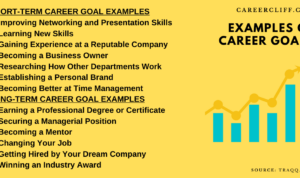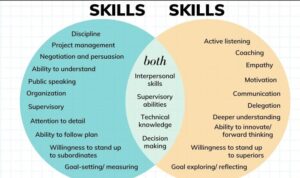Career Development Goals are crucial for professional growth, motivation, and success. Let’s dive into the world of setting and achieving these goals with swagger and style.
From skill-based goals to overcoming challenges, we’ll explore how to navigate the path to your dream career like a boss.
Importance of Career Development Goals

Setting career development goals is crucial for professional growth as it provides a clear direction and purpose for individuals in their career journey. Without specific goals, it’s easy to feel lost or stagnant in one’s career, leading to a lack of motivation and progress.
Boosting Motivation and Productivity
- Having clear career goals can boost motivation by giving individuals something to strive for and a sense of accomplishment when goals are achieved.
- Goals provide a roadmap for success, helping individuals stay focused and productive in their work.
- Knowing what you want to achieve in your career can increase job satisfaction and overall happiness in the workplace.
Impact on Job Satisfaction and Overall Success
- Well-defined career goals can lead to increased job satisfaction as individuals feel a sense of purpose and fulfillment in their work.
- Having clear goals can also help individuals make better decisions about their career path, leading to greater success and advancement opportunities.
- Employees with defined career goals are more likely to take initiative, seek out opportunities for growth, and ultimately excel in their careers.
Types of Career Development Goals

Career development goals can fall into various categories, each serving a specific purpose in advancing one’s professional journey. These categories include skill-based goals, promotional goals, and educational goals. Let’s delve into the significance of short-term versus long-term career goals and the role of personal development goals in shaping one’s career trajectory.
Skill-Based Career Development Goals
Skill-based career development goals focus on enhancing specific competencies or abilities that are crucial for success in a particular field. Examples include improving communication skills, mastering a new technology, or becoming proficient in project management.
- Enhancing technical skills through online courses or workshops.
- Developing leadership abilities by taking on more responsibilities at work.
- Gaining proficiency in a second language to expand career opportunities.
Promotional Career Development Goals
Promotional career development goals are aimed at climbing the corporate ladder and securing higher-level positions within an organization. These goals often involve acquiring the necessary experience, skills, and qualifications to be considered for promotions.
- Attaining a management certification to qualify for a leadership role.
- Demonstrating consistent high performance to be eligible for a promotion.
- Networking with senior executives to increase visibility within the company.
Educational Career Development Goals
Educational career development goals revolve around acquiring additional knowledge or qualifications to advance in a chosen field or transition to a new career path. These goals may involve pursuing further education, obtaining certifications, or attending training programs.
- Earning a master’s degree in a relevant field to enhance expertise.
- Obtaining industry-specific certifications to boost credibility.
- Attending seminars or workshops to stay updated on the latest trends in the industry.
Short-Term versus Long-Term Career Goals
Short-term career goals typically focus on immediate actions and outcomes that can be achieved within a year or less, while long-term career goals involve planning for advancements that may take several years to accomplish. Balancing both short-term and long-term goals is essential for maintaining motivation and staying on track towards long-term success.
Short-term goals provide immediate direction and a sense of accomplishment, while long-term goals offer a roadmap for future growth and fulfillment.
Role of Personal Development Goals
Personal development goals play a crucial role in shaping one’s career trajectory by focusing on self-improvement, growth, and self-awareness. These goals enable individuals to enhance their strengths, address weaknesses, and cultivate the necessary qualities for professional success.
- Improving time management skills to boost productivity and efficiency.
- Enhancing emotional intelligence to build stronger relationships with colleagues.
- Cultivating a growth mindset to embrace challenges and learn from setbacks.
Strategies for Setting Career Development Goals
Setting career development goals is crucial for personal growth and professional success. Here are some strategies to help you align your career goals with your personal values and aspirations, create SMART goals, and regularly review and adjust them as needed.
Aligning Career Goals with Personal Values and Aspirations
It is important to reflect on your personal values and aspirations before setting career goals. Consider what is truly important to you and how your career goals can align with these values. This alignment will not only motivate you but also ensure that your goals are meaningful to you.
Creating SMART Career Goals, Career Development Goals
When setting career goals, it is essential to make them SMART: Specific, Measurable, Achievable, Relevant, and Time-bound. This framework helps you create clear and actionable goals that are more likely to be achieved. Here’s how you can make your goals SMART:
- Specific: Clearly define what you want to achieve in your career.
- Measurable: Set quantifiable metrics to track your progress towards your goal.
- Achievable: Ensure that your goal is realistic and within reach with effort and commitment.
- Relevant: Make sure your goal aligns with your overall career objectives and aspirations.
- Time-bound: Set a deadline for achieving your goal to create a sense of urgency.
Regularly Reviewing and Adjusting Career Goals
It is crucial to regularly review your career goals to assess your progress and make any necessary adjustments. As you grow and evolve in your career, your goals may need to be modified to reflect your changing priorities and aspirations. By staying flexible and open to change, you can ensure that your career goals remain relevant and achievable.
Overcoming Challenges in Achieving Career Development Goals
When pursuing career development goals, individuals often face various obstacles that can hinder their progress. It is essential to identify these challenges and have strategies in place to overcome them.
Identifying Common Obstacles
Here are some common obstacles individuals face when working towards their career development goals:
- Procrastination and lack of time management skills
- Lack of clarity or direction in career goals
- Resistance to change or fear of failure
- Financial constraints or lack of resources
- Work-life balance issues
Strategies for Staying Motivated and Focused
Here are some strategies to help individuals stay motivated and focused when facing setbacks:
- Break down goals into smaller, manageable tasks
- Celebrate small victories along the way
- Seek support from friends, family, or mentors
- Practice self-care and maintain a healthy work-life balance
- Visualize success and stay positive
Benefits of Seeking Mentorship or Professional Guidance
Seeking mentorship or professional guidance can provide numerous benefits when overcoming challenges in achieving career development goals:
- Gain valuable insights and advice from experienced professionals
- Expand your network and access new opportunities
- Receive emotional support and encouragement during tough times
- Learn from others’ experiences and avoid common pitfalls
- Boost confidence and motivation to keep moving forward




